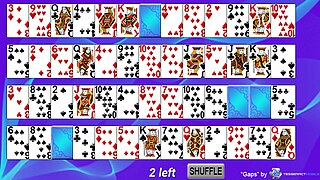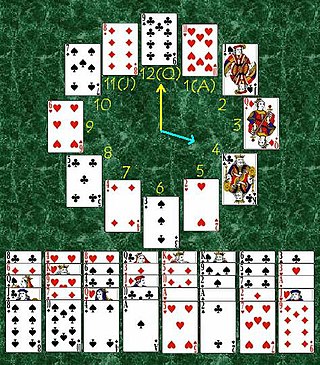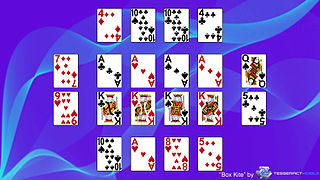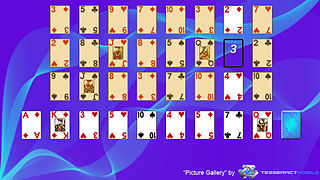Rules
Australian Patience has four Foundations build up in suit from Ace to King, e.g. A♣, 2♣, 3♣, 4♣...
The seven depots of the Tableau are filled with piles of four cards each, which build down in suit, e.g. 8♥, 7♥, 6♥, 5♥...
Like Yukon, any face-up card can be moved, but all the unrelated cards on top of it will be moved also. Only a King (with or without a pile) can be moved to an empty space.
Only one card is turned up at a time from the Deck, and these cards can be played onto the depots or the Foundations. Australian Patience only allows one pass through the deck.

Gaps is a member of the Montana group of Patience games, where the goal is to arrange all the cards in suit from Deuce to King.

Grandfather's Clock is an easy patience or solitaire card game using a deck of 52 playing cards. Its foundation is akin to Clock Patience; but while winning the latter depends entirely on the luck of the draw, Grandfather's Clock has a strategic side, with the chances of winning being around 3 out of 4 games, especially if careful consideration is given to which cards would be released in instances where you have a choice of plays between identical cards.
Bisley is a patience or card solitaire which uses a deck of 52 playing cards, and while difficult, it often can be completed successfully. It is closely related to Baker's Dozen, but the foundations are built upwards from Ace and downwards from King simultaneously. It is one of the few one-deck games in which the player has options on which foundation a card can be placed.
British Square is a patience or solitaire card game which uses two decks of 52 playing cards each. It is a fan-type game in the style of La Belle Lucie. It has an unusual feature of switchback building whereby each foundation is first built up and then built down.
Deuces or Twos is a patience or card solitaire game of English origin which is played with two packs of playing cards. It is so called because each foundation starts with a Deuce, or Two. It belongs to a family of card games that includes Busy Aces, which is derived in turn from Napoleon at St Helena.

La Belle Lucie is a patience or card solitaire where the object is to build the cards into the foundations. It is considered to be representative of the "fan" family of solitaire card games, and has a pleasing layout.
Algerian or Algerian Patience is a unique and difficult patience or card solitaire using two decks of playing cards. The object of the game is to build 8 foundations down from King to Ace or up from Ace to King in suit.
Aces and Kings is a challenging and original solitaire game using two decks of playing cards, and was created by Thomas Warfield. The object of the game is to build 8 foundations down from King to Ace or up from Ace to King without regard to suit.
American Toad is a patience or card solitaire game played using two standard packs of playing cards. It is similar to Canfield except that the tableau builds down in suit, and a partial tableau stack cannot be moved, only the top card or entire stack. The object is to move all cards to the foundations.
Backbone is a unique and difficult patience or card solitaire game using two packs of playing cards. The object is to move all cards to the foundations.
Batsford is a patience or card solitaire similar to Klondike except that it uses two decks instead of one. The cards are turned up one at a time during a single pass through the deck, and there is also a reserve pile available for a single King.
Beetle is a difficult patience or solitaire card game using two decks of playing cards. The game is similar to Spider, except the Tableau cards are faced up. The object of the game is to group all of the cards into sets of 13 in suit.

Box Kite is a moderately difficult patience or card solitaire using two packs. The object of the game is to move all of the cards to the foundations. It is a variant of the old game of St. Helena.
Casket is a moderately easy solitaire game using two decks. The object of the game is to move all of the cards to the foundations.
Corona is a relatively long and difficult patience or card solitaire using two decks. The object of the game is to move all of the cards to the foundations. Successfully winning the game is considered difficult.

Josephine is a patience or solitaire card game using two decks of playing cards. The object of the game is to move all of the cards to the Foundations. It is a variant of the more commonly known Napoleon at St Helena, and is named after Josephine de Beauharnais, Napoleon's first wife.
Three Shuffles and a Draw is a solitaire game using one deck of playing cards. This game is similar to La Belle Lucie besides being able to draw one card after the second shuffle. The object of the game is to move all of the cards to the Foundations.

Royal Parade is an old, English, two-pack patience of the half-open builder type. The object of the game is to move cards to the foundations to create a 'gallery' full of picture cards.
Double Canfield is a patience or card solitaire game using two decks of playing cards. The object of the game is to move all of the cards to the Foundations.
Acme is a patience or card solitaire of the reserved packer type using a single deck of playing cards.
This page is based on this
Wikipedia article Text is available under the
CC BY-SA 4.0 license; additional terms may apply.
Images, videos and audio are available under their respective licenses.







